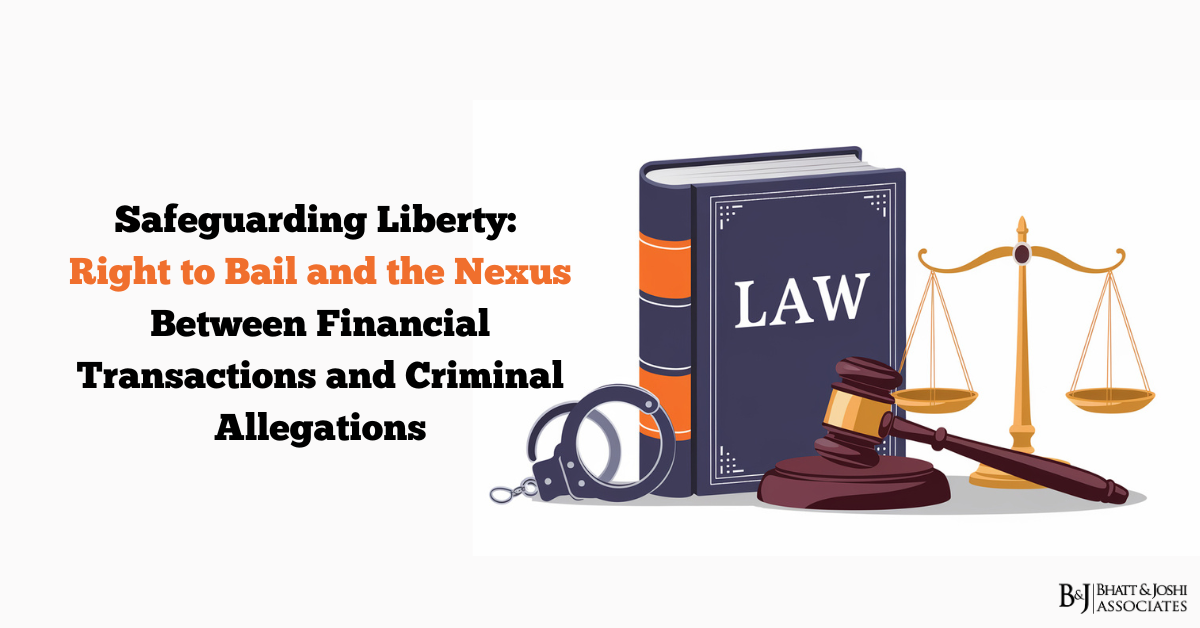Introduction
The Indian legal framework enshrines the fundamental right to life and liberty under Article 21 of the Constitution, which serves as the bedrock for the principle that “bail is the rule and jail is the exception.” In cases involving financial crimes, the courts are tasked with ensuring that the Right to Bail in financial crime cases is respected, avoiding pre-trial detention as a punitive measure”. This comprehensive discussion examines how the judiciary balances the right to liberty against the prosecutorial burden of establishing a prima facie case, with specific focus on financial transactions and the limited evidentiary value of co-accused statements in bail proceedings.
Presumption of Innocence and the Right to Bail
The presumption of innocence until proven guilty is a cornerstone of Indian criminal jurisprudence. Bail, as a manifestation of this principle, is not only a procedural safeguard but also a recognition of the individual’s right to liberty. The Supreme Court, in Sanjay Chandra vs CBI, emphasized this tenet, stating:
“The primary purposes of bail in a criminal case are to relieve the accused of imprisonment, to relieve the State of the burden of keeping him, pending the trial, and at the same time, to keep the accused constructively in the custody of the Court… The grant or denial is regulated, to a large extent, by the facts and circumstances of each particular case.”
This pronouncement underscores the need for judicial discretion to be exercised judiciously, ensuring that liberty is not arbitrarily curtailed. Courts must weigh the severity of the alleged offense and the potential punishment without allowing public sentiment to influence their decision-making.
Bail Proceedings: Avoiding a Mini-Trial
A fundamental distinction in criminal law is the difference between bail proceedings and trial proceedings. The former is not intended to determine guilt or innocence but to assess whether the accused can remain at liberty without jeopardizing the trial. As highlighted in Sanjay Chandra vs CBI, courts must avoid conducting a “mini-trial” during bail hearings and focus solely on prima facie evidence.
This principle is particularly crucial in financial crime cases, where the nexus between financial transactions and alleged criminal activities often involves complex evidentiary questions. Such determinations require a thorough trial process and cannot be conclusively resolved during bail hearings.
Financial Crime Cases: A Matter for Trial, Not Bail
Financial transactions in criminal cases often involve voluminous and intricate documentation, making the establishment of a direct connection to criminal activity a challenging task. This complexity underscores the importance of limiting the scope of inquiry during bail proceedings to a prima facie assessment.
In Jayeshbhai vs State, the Gujarat High Court granted bail to the applicant accused of financial impropriety, emphasizing that:
“As the charge sheet is already filed and the case is based predominantly on documentary evidence… with no apprehension of the applicant fleeing from justice or tampering with evidence, this Court is inclined to grant regular bail.”
This judgment highlights the court’s recognition that financial irregularities are better evaluated during trial, where the evidence can be comprehensively examined.
Similarly, in Prem Prakash vs Union Of India, the Supreme Court reversed a High Court’s denial of bail, observing that the prosecution failed to establish foundational elements of money laundering. The Court held:
“The counter affidavit of the Investigating Agency should make out a cogent case as to how the foundational facts are prima facie established… mere conjecture or suspicion cannot suffice.”
This reinforces the idea that the prosecution bears the burden of presenting credible evidence to substantiate the connection between financial transactions and alleged criminal activities, failing which the accused is entitled to bail.
Statements of Co-Accused: Limited Evidentiary Value
Another significant aspect of bail jurisprudence is the limited evidentiary value accorded to statements made by co-accused. Under Section 30 of the Evidence Act, such statements do not constitute substantive evidence and cannot form the sole basis for denying bail.
In Prem Prakash vs Union Of India, the Supreme Court scrutinized a co-accused’s statement implicating the appellant and held:
“Being a co-accused with the appellant, his statement… will not have the character of substantive evidence. The prosecution cannot start with such a statement to establish its case.”
This ruling clarifies that while co-accused statements may lend corroborative support to independent evidence, they cannot independently justify the denial of bail.
Balancing Liberty and Prosecutorial Duty
The judicial pronouncements discussed reflect a careful balancing act between safeguarding individual liberty and ensuring the interests of justice. Courts have repeatedly emphasized that:
- Pre-trial detention should not be punitive.
- Bail applications must be adjudicated based on prima facie evidence rather than speculative or incomplete allegations.
- Complex issues of financial impropriety or alleged criminality should be resolved through a detailed trial, not during bail proceedings.
These principles are rooted in the constitutional mandate to uphold personal liberty while ensuring that prosecutorial duties are rigorously fulfilled.
Conclusion: Safeguarding the Right to Bail in Financial Crime Cases
Indian jurisprudence on bail, particularly in financial crime cases, underscores the judiciary’s commitment to protecting individual liberty while ensuring accountability. The presumption of innocence and the right to bail form the foundation of a fair criminal justice system. Courts must remain vigilant against the misuse of pre-trial detention and ensure that bail is denied only in cases where a prima facie case, supported by credible evidence, is established.
Financial crimes, with their inherent complexities, require a nuanced approach. The trial, not bail proceedings, is the appropriate forum for resolving questions about the nexus between financial transactions and criminal allegations. Statements of co-accused, unless corroborated by independent evidence, cannot form the primary basis for denying bail.
Ultimately, these judicial safeguards ensure a balance between individual rights and societal interests, reflecting the Indian legal system’s dedication to justice and fairness.














